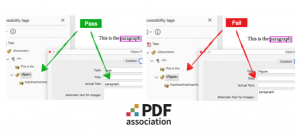New Techniques for Accessible PDF
The PDF Association's new Techniques will help software developers, authors, and remediators to create PDF files that meet the needs of users with disabilities.
WINCHESTER, MA, UNITED STATES, January 7, 2025 /EINPresswire.com/ -- Today the PDF Association announces its beta release of Techniques for Accessible PDF to help software developers, document authors, and remediators create accessible PDF files that better meet the needs of users with disabilities.Drawing on the expertise of the members of its PDF Accessibility Liaison Working Group and community feedback, the Techniques for Accessible PDF provide authoritative answers to questions on how to make PDF files accessible consistent with both ISO 14289, the international standard for accessible PDF and W3C’s WCAG standard for accessible web content.
The new Techniques will advance accessibility of digital documents across the full spectrum of PDF use cases, including office documents, rich layouts produced by desktop publishing applications and high volume documents generated by government, banking, insurance and other providers.
These Techniques provide vendor-neutral information and example files allowing PDF files to be precisely tested while ensuring software developers retain maximum flexibility and potential for innovation.
The PDF Association's Techniques improve upon WCAG’s Techniques for PDF in several ways while remaining consistent with the manner in which WCAG’s Techniques are presented:
- Type and nature of Techniques
W3C’s WAI published 23 PDF Techniques in 2008; none have been added since. W3C’s Techniques cover only a few of the criteria that contribute to accessible PDF files, and do not distinguish between Techniques that apply to any PDF file vs. Techniques that apply only as required by a given document's content.
By contrast, the PDF Association will deliver hundreds of Techniques over the next 18 months, beginning with 18 Techniques and 20 failures that the organization categorizes as “Fundamental”. Many additional Techniques specific to individual use cases (e.g., tables and lists) will be published on a quarterly basis going forward.
- Vendor-neutral Techniques
W3C WAI’s PDF Techniques provide advice regarding the use of specific software that was available in 2007 / 2008. Today, these Techniques are seriously dated.
By contrast, the PDF Association's Techniques are entirely vendor-neutral, and focus attention on the file rather than the producing application. This approach enables all users, regardless of their preferred software, to engage with the Techniques.
- Example PDF files
W3C WAI’s PDF Techniques provide some scraps of PDF code to illustrate correct structure within PDF files, but these code examples cannot be opened and examined in a PDF viewer.
By contrast, every PDF Association Technique includes a functional PDF file demonstrating a correct or incorrect approach to the subject covered by that Technique.
- PDF Accessibility Technique Support Finder
W3C WAI’s PDF Techniques are numbered for ease in referencing, but do not provide a mechanism to both allow vendors to unambiguously associate software features with Techniques, or allow users to easily find software that supports given Techniques.
By contrast, the PDF Association’s Techniques include a unique text string that may be deployed by vendors on corresponding software documentation web pages to indicate their support for the Technique. End users may perform web searches using this string in conjunction with a vendor or product name in order to locate vendor-specific software and documentation that claims support for the Technique.
The PDF Association hopes that all stakeholders in PDF accessibility will benefit from these Techniques. Software developers, document authors and remediators using these Techniques will create accessible documents more easily so as to better meet the needs of users with disabilities.
Duff Johnson
PDF Association
+1 617-283-4226
email us here
Visit us on social media:
LinkedIn
Legal Disclaimer:
EIN Presswire provides this news content "as is" without warranty of any kind. We do not accept any responsibility or liability for the accuracy, content, images, videos, licenses, completeness, legality, or reliability of the information contained in this article. If you have any complaints or copyright issues related to this article, kindly contact the author above.

